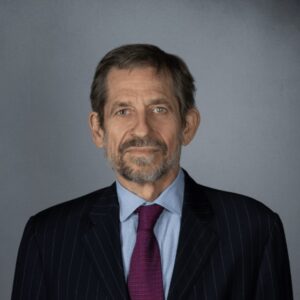 Thomas E. Graham is a distinguished fellow at the Council on Foreign Relations. His book, Getting Russia Right, was published in September, 2023. He is a cofounder of Yale University’s Russian, East European, and Eurasian studies program and sits on its faculty steering committee. He is also a research fellow at Yale’s MacMillan Center. He has been a lecturer in global affairs and political science since 2011, teaching courses on U.S.-Russian relations and Russian foreign policy, as well as cybersecurity and counterterrorism. Graham was special assistant to the president and senior director for Russia on the National Security Council staff from 2004 to 2007, during which he managed a White House-Kremlin strategic dialogue. He was director for Russian affairs on the staff from 2002 to 2004.
Thomas E. Graham is a distinguished fellow at the Council on Foreign Relations. His book, Getting Russia Right, was published in September, 2023. He is a cofounder of Yale University’s Russian, East European, and Eurasian studies program and sits on its faculty steering committee. He is also a research fellow at Yale’s MacMillan Center. He has been a lecturer in global affairs and political science since 2011, teaching courses on U.S.-Russian relations and Russian foreign policy, as well as cybersecurity and counterterrorism. Graham was special assistant to the president and senior director for Russia on the National Security Council staff from 2004 to 2007, during which he managed a White House-Kremlin strategic dialogue. He was director for Russian affairs on the staff from 2002 to 2004.
Graham served as an advisor to Kissinger Associates from 2008 to 2021. He was a Foreign Service officer for fourteen years. His assignments included two tours of duty at the U.S. Embassy in Moscow in the late Soviet period and in the middle of the 1990s, during which he served as head of the political internal unit and acting political counselor. Between tours in Moscow, he worked on Russian and Soviet affairs on the policy planning staff at the U.S. Department of State and as a policy assistant in the office of the undersecretary of defense for policy.
Graham holds a BA in Russian studies from Yale University and an MA in history and a PhD in political science from Harvard University.
Summary
Thomas Graham provided a comprehensive analysis of the Russia-Ukraine war, focusing on its origins, the antagonists’ motivations, and potential outcomes. He began by highlighting Russia’s broader geopolitical objectives, arguing that the war is not just about Ukraine but about revising the post-Cold War European security order. Russia sees NATO and EU expansion as threats, viewing Ukraine as an essential buffer zone and a key part of its historical and economic identity.
From the Ukrainian perspective, the war is an existential struggle for national survival. Ukraine has long resisted Russian efforts to integrate it into Moscow-led initiatives, striving for independence and Western integration. Graham emphasized that the war has turned into a prolonged battle of attrition, contrary to Putin’s expectations of a swift victory. Heavy casualties on both sides raise concerns about Ukraine’s long-term ability to sustain the fight, given its smaller population.
The discussion moved toward the role of the United States, whose primary interest in the conflict has been to maintain European stability and uphold post-World War II norms against territorial conquest. While U.S. support has been vital to Ukraine, the war has generated internal debates over continued aid and NATO’s future role. The speaker warned that declining U.S. commitment could shift the burden onto Europe, which may struggle to provide the necessary military and financial backing.
Regarding negotiations, Graham is skeptical that meaningful talks can succeed under current conditions. Putin remains firm on his maximalist demands, including Ukraine’s demilitarization and recognition of annexed territories. Meanwhile, Western reluctance to offer full NATO membership to Ukraine complicates security guarantees for Kyiv. The speaker suggested that a sustainable settlement would require continued Western support, pressure on Russia, and strong European coordination.
The conversation also touched on broader geopolitical shifts, including Europe’s increasing defense readiness and the strategic consequences for Russia. While Putin may gain Ukrainian territory, his actions have driven Sweden and Finland into NATO, fortified European security efforts, and deepened Russia’s dependence on China. The speaker noted some internal Russian discontent with the war but doubted that it will coalesce into a political challenge against Putin in the near term.
In conclusion, Graham underscored the high stakes of the conflict and the uncertain path ahead. While Ukraine continues to resist, its long-term success depends on Western unity, strategic planning, and the ability to counter Russia’s attritional warfare.
